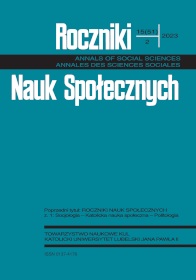IMPLIKACJA TERRORYZMU W BUDOWANIU MECHANIZMU ODPORNOŚCI LUDNOŚCI CYWILNEJ
W HYBRYDOWYCH KONFLIKTACH ZBROJNYCH
IMPLICATION OF TERRORISM IN BUILDING A HYBRID RESILIENCE MECHANISM FOR CIVILIANS IN ARMED CONFLICTS
Author(s): Wojciech WróblewskiSubject(s): Security and defense, Military policy, Peace and Conflict Studies
Published by: Towarzystwo Naukowe KUL & Katolicki Uniwersytet Lubelski Jana Pawła II
Keywords: terrorism; hybrid warfare; civil protection; security;
Summary/Abstract: Nowadays, the term hybrid warfare is increasingly common in the international security community. To date, several scientific and formal definitions of this issue have been developed, but it remains a contentious and imprecise concept. In common parlance, the term hybrid war is most often used to describe the so-called Ukrainian crisis, which escalated in 2022 and took the form of an informal armed conflict. Hybrid war is assumed to mean a combination of conventional and unconventional tactics of a military and non-military nature. One of the elements of hybrid threats is terrorism, which is a more widely analyzed threat in the routine security environment (state of peace) and in conditions of armed conflict. In contrast, in the case of a hybrid conflict, it is an issue that has been narrowly developed. Acts of terrorism in hybrid tactics can have a network character (i.e., an integrated multi-vector attack) and a cascading effect (i.e., effects affecting each other). Such a state of affairs can affect civilian security more broadly than in other states. Thus, there is an urgent need to understand the use of terrorism tactics in a full-scale hybrid conflict and its impact on civilian security.
Journal: Roczniki Nauk Społecznych
- Issue Year: 51/2023
- Issue No: 2
- Page Range: 169-182
- Page Count: 14
- Language: Polish

